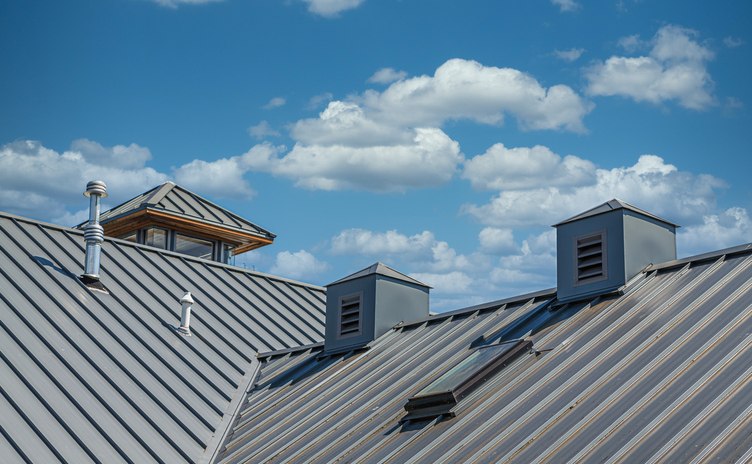
12 Things You Should Know About Metal Roofing
When it comes time to choose a roofing material for your business, metal roofing stands out as a premier option. Known for its durability, aesthetic appeal, and long-term cost benefits, metal roofing has become increasingly popular. In this article, we will explore 12 crucial aspects of metal roofing that every business owner should consider. From the variety of materials available to the impact on energy efficiency and maintenance requirements, you’ll gain a comprehensive understanding of why metal roofing might be the best choice for your commercial property.
1. Variety of Metal Roofing Materials
One of the first things to know about metal roofing is the variety of materials available. Metal roofing panels are made of metals such as copper, aluminum, steel, and zinc. Each type of metal roofing has its unique advantages. Aluminum, for instance, is a metal that is lightweight and resistant to corrosion, making it perfect for areas on the coast. Copper offers a distinctive appearance and exceptional longevity, while zinc is known for its eco-friendliness and self-healing properties.
2. Durability and Lifespan
Metal roofing is known for its durability and long lifespan. Unlike traditional asphalt shingles that may require replacement as often as every 15-20 years, metal roofs can endure for more than 50 years with proper care. Some metals, like copper and zinc, can even last over a century. This impressive durability makes metal roofing a cost-effective investment over time, as it significantly reduces the need for frequent repairs and replacements.
3. Cost Considerations
While the initial metal roofing cost can be higher than that of other materials, it is important to consider the potential long-term savings. Metal roofs offer superior durability and require less maintenance, resulting in lower overall costs. Additionally, metal roofing types such as standing seam and metal shingles provide excellent value for money, given their longevity and performance. When calculating the metal roofing cost, factor in the potential savings on repairs, maintenance, and energy bills.
4. Energy Efficiency Benefits
Metal roofing panels are highly reflective, which helps to reduce heat absorption. This gives your air conditioner a break, which can lead to sizable energy savings, especially throughout the hot summer months. By reflecting sunlight, metal roofs help keep your business cooler, reducing the need for air conditioning and lowering energy bills. Some metal roofing types also come with special coatings that enhance their energy efficiency further.
5. Maintenance and Care
Another of the main advantages of metal roofing is its low maintenance requirements. Metal roofs are less susceptible to common roofing issues like cracking, shrinking, and eroding. Regular inspections and occasional cleaning help keep metal roofs in excellent condition, though different climates may require extra care. Additionally, metal roofing supply companies often offer products with protective coatings that enhance resistance to rust and corrosion, further reducing maintenance needs.
6. Environmental Impact
Metal roofing is an eco-friendly option for several reasons. Many metal roofing panels are made from recycled materials, and at the end of their long life, they can be recycled again. This helps by reducing the demand for new raw materials and minimizing waste. Additionally, the energy efficiency benefits of metal roofing help lower carbon emissions, making it a sustainable option for environmentally conscious property owners.
7. Weather Resistance
Metal roofs offer exceptional weather resistance, making them suitable for various climates. They can handle extreme weather conditions such as heavy snow, high winds, hail, and even wildfires. The interlocking design of metal roofing panels provides added strength and protection against water infiltration and wind damage. This resilience ensures that metal roofing types remain intact and functional even in the harshest weather.
8. Noise Considerations
A common concern with metal roofing is noise during rain or hailstorms. However, modern metal roofing installation techniques and insulation options can significantly reduce noise levels. By adding a solid sheathing layer and using appropriate insulation materials, you can enjoy the benefits of metal roofing without worrying about excessive noise.
9. Design and Aesthetic Options
Metal roofing materials come in a wide variety of designs and aesthetic options. From traditional styles that mimic the look of shingles, slate, or tile, to contemporary, sleek profiles, metal roofs can complement any architectural style. Metal roofing panels are available in various colors and finishes, allowing owners to achieve the desired look for their property. This versatility makes metal roofing a popular choice for anyone looking to boost their property’s curb appeal.
10. Installation Process and Considerations
The metal roofing installation process is quick and straightforward when compared to other roofing materials. However, it requires specialized skills and tools, so it is essential to hire experienced professionals. Proper installation is vital to ensure the performance and longevity of a metal roof. Additionally, the installation process may involve considerations such as the type of underlayment, ventilation, and the compatibility of metal roofing supply products with existing structures.
11. Insurance and Warranties
Due to their durability and resistance to damage, many insurance companies give discounts on commercial property insurance for properties with metal roofs. Additionally, most metal roofing manufacturers provide warranties that cover 20 to 50 years or more. These warranties often cover issues such as rust, paint fading, and water leaks. Be sure to review the warranty terms and understand what is covered before purchasing a metal roof.
12. Local Building Codes and Regulations
Before installing a metal roof, it is important to educate yourself on local building codes and regulations. Many areas have their own requirements or restrictions concerning roofing materials, including metal roofing types. Adhering to these regulations will help avoid potential issues during the metal roofing installation process and make certain that your new metal roof meets all safety and performance standards.
Enhance Your Commercial Property with Commercial Roofing Rana
Choosing metal roofing is a smart investment for business owners seeking durability, energy efficiency, and long-term value. With over four decades of experience, Commercial Roofing Rana, proudly serving Memphis and Nashville, TN, and Tupelo and Jackson, MS, is dedicated to providing superior service and building long-lasting relationships with our customers. Our family-owned business combines expertise with a customer-first approach, ensuring that you receive a roofing solution tailored to your specific needs. Don’t wait to enhance your business with the lasting benefits and aesthetic appeal of metal roofing. Contact us today, and let us deliver the quality and care you deserve.
